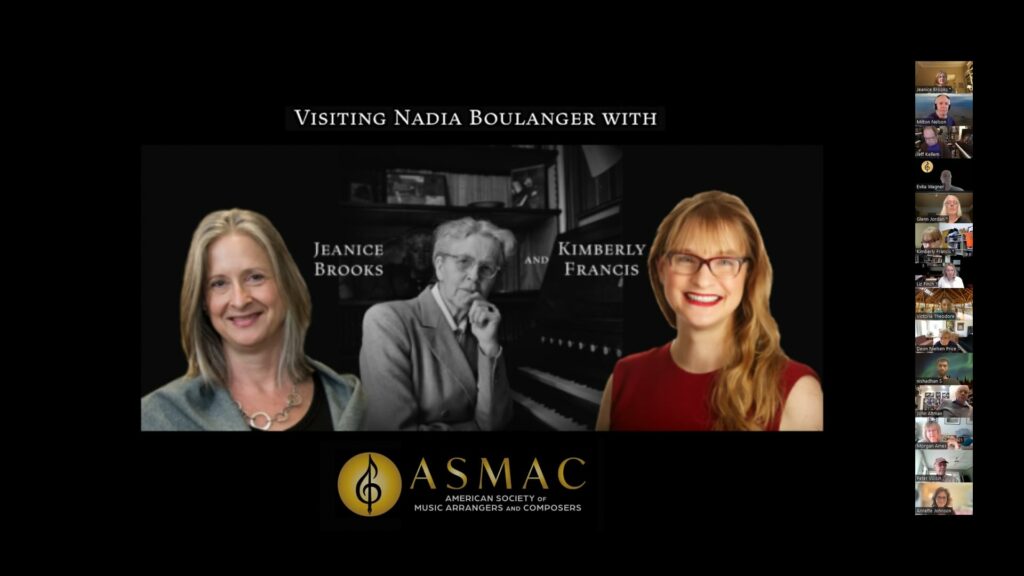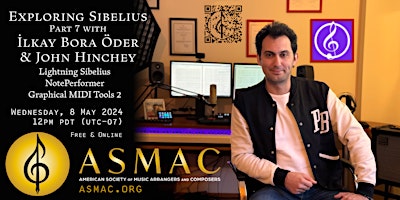Event: Visiting Nadia Boulanger with Jeanice Brooks & Kimberly Francis
Date: Saturday, 16 March 2024
Location: Online via Zoom
ASMAC members can re-watch the 3-hour event video.
Esteemed Guests: Jeanice Brooks & Kimberly Francis
During this captivating event, attendees embarked on a historic journey through the life and legacy of Nadia Boulanger, one of the most influential figures in 20th-century music. Renowned for her contributions as a composer, conductor, and music educator, Boulanger’s impact on the world of music was profound. It was all presented by our two distinguished guests:
Professor Jeanice Brooks, an acclaimed musicologist and author, provided valuable insights into Boulanger’s life, exploring her early years, her musical training, and her groundbreaking pedagogical methods. With her expertise in historical research and analysis, Brooks shed light on the cultural and social contexts that shaped Boulanger’s extraordinary career. Jeanice Brooks holds the esteemed position of Professor of Music at the University of Southampton. With a versatile research focus, her scholarly pursuits encompass various aspects of music and culture across different historical periods.
Professor Brooks’ research interests span a wide array of topics, including music and culture in Renaissance France, the musical landscape of mid-twentieth-century Europe, domestic music- making in Britain around 1800, and the intersection of song and gender. With a PhD in musicology and a specialization in French literature, she explores various research topics, blending both literary and musical sources to enhance her studies. A significant portion of Professor Brooks’ research is dedicated to the illustrious career of Nadia Boulanger, the renowned French pedagogue.
Her seminal work The Musical Work of Nadia Boulanger: Performing Past and Future Between the Wars (Cambridge University Press, 2013) delves into how modernist concepts of the musical work influenced performance culture in the interwar period. This groundbreaking study sheds light on Boulanger’s profound impact on 20th-century music. Furthermore, Professor Brooks’ extensive work on Nadia Boulanger has culminated in two recent edited volumes, both released in 2020. Nadia Boulanger and Her World, published in association with the Bard Music Festival, and Nadia Boulanger: Thoughts on Music (University of Rochester Press, 2020) offer nuanced insights into Boulanger’s life, work, and enduring legacy.
In addition to her contributions to the Boulanger scholarship, Brooks has made significant strides in early music studies. Her monograph Courtly Song in Late Sixteenth-Century France (University of Chicago, 2000) examines the intersection of music and courtly ideologies during the Renaissance. This work was recognized with the prestigious Roland H. Bainton Prize in 2001, awarded for the best book of the year in music or art history. Professor Brooks’ scholarly output extends beyond monographs to include numerous articles published in esteemed journals such as the Journal of the American Musicological Society, Review of English Studies, Early Music History, and Renaissance Quarterly, among others. Her editorial leadership includes serving as co-editor of Music & Letters from 1999–2004 and spearheading the digital edition of the Austen Family Music Books in 2015. In 2023, Professor Brooks co-edited the Renaissance volume of the Cultural History of Western Music (Bloomsbury, 2023). Professor Jeanice Brooks continues to be a driving force in the field of musicology.
Kimberly Francis is a distinguished feminist musicologist and scholar, who further illuminated Boulanger’s legacy, focusing on her influence on subsequent generations of composers and musicians. Through engaging anecdotes and scholarly discourse, Francis highlighted Boulanger’s lasting impact on the development of classical music and music education. Dr. Kimberly A. Francis holds the esteemed position of Professor of Music at the University of Guelph, where she also serves as the Director of Interdisciplinary Studies for the College of Arts and an affiliate of the Sexualities, Genders, and Social Change program. With a fervent dedication to championing equitable and inclusive practices in the field of musicology, Dr. Francis’s research explores the intersections between gender and cultural engagement. Numerous accolades and international recognition mark her illustrious career. In 2010, the University of North Carolina at Chapel Hill awarded Dr. Francis the Glen Haydon Award for her PhD in musicology.
She has held prestigious positions as an International Fellow with the American Association of University Women, an ERASMUS Mundus Visiting Scholar at Sheffield University, and a scholar-in-residence at Potsdam University. Dr. Francis’s research has garnered widespread acclaim. She was a featured presenter at the August 2021 Bard Music Festival, where she illuminated the life and legacy of Nadia Boulanger in the first Bard Festival centered on a woman musician. Additionally, she hosted the 30th Anniversary international Feminist Theory and Music conference at the University of Guelph in July 2022, an event supported by a SSHRC Connections Grant and the Office of Research at the University of Guelph. A five-year SSHRC Insight Grant currently supports Dr. Francis’s research, where she and Sofie Lachapelle are investigating the development and normalization of French speech sounds from 1850–1914. She is also co-editing a series of collected essays on creative women in the shadow of the First World War with Margot Irvine. Her monograph project delves into the engagement of French and white women composers with the occult during the interwar years.
Dr. Francis also co-curates “A Sonic Tapestry,” a series capturing Guelph musicians’ reactions to the COVID-19 pandemic. As an accomplished author, Dr. Francis’s contributions to scholarship are profound. Her book Teaching Stravinsky: Nadia Boulanger and the Consecration of a Modernist Icon (Oxford University Press, 2015) received the prestigious ASCAP-Deems Taylor/Virgil Thomson Award in 2016. She has also edited Nadia Boulanger and the Stravinskys: A Selected Correspondence (University of Rochester Press, 2018) and co-edited Nadia Boulanger: Thoughts on Music (University of Rochester Press, 2020).
Dr. Francis’s scholarly output extends to numerous articles in esteemed journals, including the Cambridge Opera Journal, 19th- Century Music, The Musical Quarterly, and Women and Music. She serves on the Board of Women and Music: A Journal of Gender and Culture and chairs the American Musicological Society’s Membership and Professional Development Committee. Alongside Rob Pearson, she co-chairs the AMS’s Sustainable Mentorship Program and, with Tes Slominski, serves as co-editor-in-chief of Grove Music Online’s special project on sexuality and gender.
Nadia Boulanger’s life unfolded during a time when societal attitudes towards women’s roles in academic and professional spheres were often restrictive and discriminatory. Boulanger came of age in an era marked by deeply entrenched gender norms and systemic barriers that limited women’s access to education and professional opportunities. In the documentary film Mademoiselle (1977) by Bruno Monsaingeon about Nadia Boulanger, it is said that she often wore men’s clothes to be taken seriously.
During the late 19th and early 20th centuries, women faced significant challenges in pursuing higher education and entering male- dominated fields such as music composition, conducting, and music pedagogy. Cultural perceptions of women’s intellectual capacities often relegated them to roles considered more suitable or traditional, such as homemaking or teaching at the elementary level. In the realm of classical music, women composers and conductors encountered widespread prejudice and skepticism regarding their artistic abilities. Female musicians were frequently marginalized and excluded from prestigious institutions and professional opportunities, facing skepticism and resistance from their male counterparts and gatekeepers in the music industry. Despite these obstacles, Nadia Boulanger defied societal expectations and forged a groundbreaking career as a composer, conductor, and music educator.
Through her exceptional talent, determination, and relentless pursuit of excellence, she challenged entrenched gender norms and shattered glass ceilings in the world of classical music. Her unwavering commitment to her craft and her refusal to succumb to gender-imposed limitations are testaments to Boulanger’s remarkable achievements. As a pioneering figure in music history, she paved the way for future generations of women to pursue their musical aspirations and claim their rightful place in the canon of classical music. Her legacy continues to inspire and empower aspiring musicians, transcending the constraints of gender and time.
Nadia Boulanger was born on September 16, 1887, in Paris, France. She did composition, advocacy, acquisition, and teaching. Her life, marked by exceptional talent, dedication to teaching, and profound musical insights, unfolded in distinct stages, each contributing to her enduring legacy. She taught many famous figures such as Quincy Jones, Dinu Lipatti, Idil Biret, Daniel Barenboim, Jeremy Menuhin, Krzysztof Penderecki, Elliot Carter, Lennox Berkeley, Aaron Copland, Jean Francaix, Virgil Thompson, Walter Piston, Roger Sessions, Andrzej Panufnik, Michel Legrand, Pierre Schaeffer, Igor Markevitch, and George Gershwin.
A number of ASMAC-affiliated composers also studied with Boulanger. A few of them were:
- Robert Russell Bennett, the first president of ASMAC, a renowned composer and arranger who remained lifelong friends with her,
- Conrad Salinger,
- Paul Chihara,
- Jack Smalley,
- Don James,
- Quincy Jones (ASMAC Golden Score Award 1994 and Advisory Board), and
- Charles Fox (ASMAC Golden Score Award 2017).
A partial student list can be found here: https://www.nadiaboulanger.org/nb/amstudents.html
Boulanger’s early years were defined by her immersion in music at a young age. Raised in a musical family, she received her initial training at the Paris Conservatoire, where she displayed extraordinary proficiency in piano, violin, and composition. As a performer, she started as an organist. She graduated from the conservatory in 1904. Under the guidance of renowned composers such as Gabriel Fauré and Charles-Marie Widor, she honed her skills and gained acclaim by winning the prestigious Prix de Rome in 1908 at the age of 21.
The outbreak of World War I marked a turning point in Boulanger’s life. Temporarily setting aside her compositional pursuits, she turned to teaching as a means of supporting herself financially. This period of transition laid the foundation for her subsequent career as a pedagogue, as she discovered a deep passion for nurturing the talents of others. Throughout the 1920s, Boulanger established herself as a leading music educator, attracting students from around the world to her private studio in Paris.
Her teaching style was characterized by its rigor and intensity, as she imparted not only technical skills but also a profound understanding of musical expression and interpretation. Her influence extended far beyond the confines of the classroom, as her students went on to become some of the most prominent composers and conductors of their generation. In addition to her work as a teacher, Boulanger pursued a career as a conductor and performer, showcasing her exceptional musicianship and interpretive abilities. Her performances, marked by precision and emotional depth, earned her widespread acclaim and further solidified her reputation as a musical icon.
Boulanger’s compositional output, though relatively modest in quantity, reflected her distinctive voice and mastery of form. Among her most important compositions are:
- 3 Pièces Pour Alto Et Piano, composed in 1911, demonstrate Boulanger’s early exploration of form and expression, showcasing her proficiency as a pianist and composer.
- Le Couteau, composed in 1922, is a short song that evokes so much melancholy pain and darkness, all in the name of love. The song captivates audiences with its emotional depth and dramatic intensity. Her album Unknown Muse of Nadia Boulanger (2017) by Lucy Mauro, which includes Le Couteau with Briton Edwin Crossley-Mercy, was nominated at the 60th Grammy Awards for the Best Classical Compendium.
- Aria from the opera La Ville morte stands as a testament to her ability to craft evocative and compelling music for the stage. Premiered at the Gothenburg Opera in March 2020, her opera received critical acclaim for its haunting melodies, rich harmonies, and powerful storytelling.
Nadia Boulanger’s contributions to music extended beyond her roles as a composer, conductor, and educator to include significant contributions to music literature. Among these publications were A Collection of Figured Bass Lines, co-authored with Paul Vidal, and The Fundamental Principles of Harmony, co-authored with Narcis Bonet. These works exemplified her deep understanding of musical theory and pedagogy. Additionally, other materials mentioned during the event, such as Kimberly Francis’s Mediating Modern Music: Nadia Boulanger Constructs Igor Stravinsky, a PhD thesis from 2010.
As the 20th century progressed, Boulanger’s influence continued to grow, transcending geographical and cultural boundaries. From the 1930s through the 1970s, she mentored successive generations of musicians, leaving an indelible mark on the world of music education. Her pedagogical methods, emphasizing individual expression and artistic integrity, revolutionized the field of music education and remain influential to this day. Nadia Boulanger’s teaching methods were renowned for their meticulous attention to detail and depth of analysis. As a composition and music analysis instructor, she possessed perfect pitch and imparted her knowledge with precision and thoroughness.
Boulanger was at the forefront of recognizing the significance of Igor Stravinsky’s compositional evolution, delving into works such as Firebird, Symphony of Psalms, and Rite of Spring with unparalleled scrutiny. Additionally, her fascination with Claudio Monteverdi led her to meticulously map out the proportions, historical context, prosody, and structural intricacies of musical scores. She emphasized the importance of understanding the balance, harmonization, orchestration, and biographical background of composers, along with aspects like motivic development and intervalic relationships.
In her lessons, Boulanger encouraged students to analyze the dodecaphonic series in Webern’s String Quartet, inspiring them to explore avant- garde techniques. Solfeggio exercises were a staple of her teaching, providing students with a foundation for enhancing their musical ear and sight-reading abilities. Boulanger also fostered creativity by allowing students to freely explore and develop their musical styles during practice sessions. Known for her engaging teaching style, Boulanger frequently engaged her students in dialogue, posing questions to stimulate critical thinking and deepen their understanding of musical concepts. For aspiring students seeking her guidance, Boulanger’s inquiry, “If you can live without music, then thank the Lord and goodbye,” served as a poignant reminder of the profound significance of music in one’s life. Nadia Boulanger passed away on October 22, 1979, at the age of ninety- two, but her legacy lives on in the countless students whose lives she touched and transformed.
During the event, attendees also had the privilege of hearing a personal story from one of Nadia Boulanger’s students, Charles Fox. He reminisced about his time studying composition and orchestration under Boulanger’s guidance. He revealed that his piano teacher introduced him to her, inspiring him to pursue studies in Paris. Despite financial constraints, Boulanger generously offered to teach him for free, demonstrating her dedication to nurturing young talent. Fox described Boulanger’s lessons as both challenging and joyful, highlighting the enriching experience of attending her keyboard harmony classes. He fondly recalled the weekly Cantatas sessions, where students would gather to sing under Boulanger’s direction.
In addition to sharing his memories of Boulanger, Fox discussed his documentary film Killing Me Softly with His Songs, produced by Gold Entertainment Media Group in 2022. The film celebrates the transformative power of music, showcasing live performances by acclaimed artists such as Jason Alexander, Barenaked Ladies, and Alain Boublil. Through intimate conversations and personal anecdotes, the film traces Fox’s journey from the Bronx to Paris, Hollywood, and Havana, offering a glimpse into the diverse and colorful tapestry of his life.
The event proved to be an enriching and inspiring experience, celebrating the enduring legacy of Nadia Boulanger and exploring the timeless significance of her contributions to the world of music. At the conclusion of the event, a thrilling lottery took place where participants had the chance to win free ebooks authored by Jeanice Brooks and Kimberly Francis, as well as other noteworthy titles. The ebooks offered were as follows:
- Nadia Boulanger and the Stravinskys: A Selected Correspondence, edited by Kimberly Francis (University of Rochester Press, 2018)
- Teaching Stravinsky: Nadia Boulanger and the Consecration of a Modernist Icon by Kimberly Francis (Oxford University Press, 2015)
- The Musical Work of Nadia Boulanger by Jeanice Brooks (Cambridge University Press, 2013)
- Nadia Boulanger: Thoughts on Music, co-edited by Jeanice Brooks and Kimberly Francis (Univesity of Rochester Press, 2020)
- Killing Me Softly: My Life in Music by Charles Fox (Scarecrow Press, 2010)




